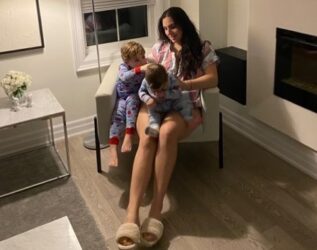The COVID-19 pandemic affected many parents negatively and caused increased parental burnout rates and anxiety.
A study conducted by 100 scientists from 42 countries around the world showed Canada as one of the highest-ranked countries in parental burnout with six to seven per cent rates after the highest-ranked country, the United States, with eight per cent.
Since the start of the COVID-19 pandemic, many parents have been trying to balance work and their social life with their kids’ needs, which has led them to stress and anxiety causing parental burnout.
“It’s such a tough time for kids and families right now, and especially for kids and families that have mental health issues,” said Jessica Behnke, the director of Strategic Relations and Communications at Children’s Mental Health Ontario (CMHO).
Behnke said the CMHO has around 20 chapters of parent-peer support programs around the province that has been operating throughout the pandemic to provide support to parents in need.
Behnke said one of the key pieces of advice given to parents is to prioritize self-care because “taking care of yourself is an important way to help support everyone in your family.
“When you’re doing better, the rest of your family is doing better,” she said.
A study published in the Lancet Psychiatry reported increased mental health problems in mothers aged between 25 and 44 during COVID-19. The rates of depression and anxiety among Canadian mothers almost doubled from the rates before the COVID-19 pandemic.
Results of the study reported that the percentage of Canadian mothers that showed depression symptoms went up to 35 per cent, from 19 per cent, and the percentage of women that showed anxiety symptoms went up to 31 per cent from 18 per cent during COVID-19.
The study suggested one of the reasons for these increased parental burnout symptoms is that some parents took on the role of homeschooling their children in addition to their other responsibilities.
Olivia Elkhoury, a mom of two boys, was one of these parents. She planned to put her older son Knight, 3, into preschool, but school shutdowns in Ontario cancelled her plans, and she had to start teaching him.

Olivia Elkhoury, mom to Knight and Reign, has been struggling to maintain good mental health during the pandemic with nonstop parenting and teaching her sons from home at their own learning level. Photo credit: Courtesy Oliva Ekhoury
“We do preps for his daycare classes,” Elkhoury said. “We do that every day.
“We do a couple of pages of workbooks, and we try and do like sorting and counting throughout the day and reading throughout the day,” she said. “I went and I bought all the puzzles, and colouring books, everything I could to kind of distracts him and adds more activities during the day, which led to burnout for sure.”
A study from the CMHO found 34.5 per cent of parents in Canada were bothered by the additional responsibilities of teaching and doing schoolwork with their kids, and 29 per cent of them reported signs of parental burnout and worse overall mental health.
At the beginning of the pandemic, Elkhoury was pregnant with her second son, Reign, who is now eight months old. She said she was always emotionally exhausted as all their plans as a family during her pregnancy got cancelled, and they were stuck at home.
“It definitely affected my mental health very negatively, like, I had so many fun things to look forward to, baby showers and I wanted to travel before the baby came through,” she said. “All of that, mixed with pregnancy and emotions, it was just a very very tough year.
“It’s been very difficult mentally and my mental state has been tested a lot,” Elkhoury added.
To stay healthy, feel better, and clear their minds, Behnke suggested parents go for walks, exercise, eat well, and establish a routine for their family as much as possible.
Elkhoury agreed and added those routines helped her feel better.
“We developed the habit of going for walks after dinner, that really helped a lot. I suggested to everybody I talked to that I was doing it,” she said.
Taking the time and accepting the hardships the COVID-19 pandemic brought are difficult but crucial steps to recognize and fight parental burnout.
“It’s just really hard, and I think part of a parent is just about having grace with yourself about how hard this is, and as a family how hard this is, and just recognizing that and not being too hard on yourself,” Behnke said.
Elkhoury said parents should not be hard on themselves and to take a step back, take a breather and relax.
“It’s normal, we are all going through it,” she said.
